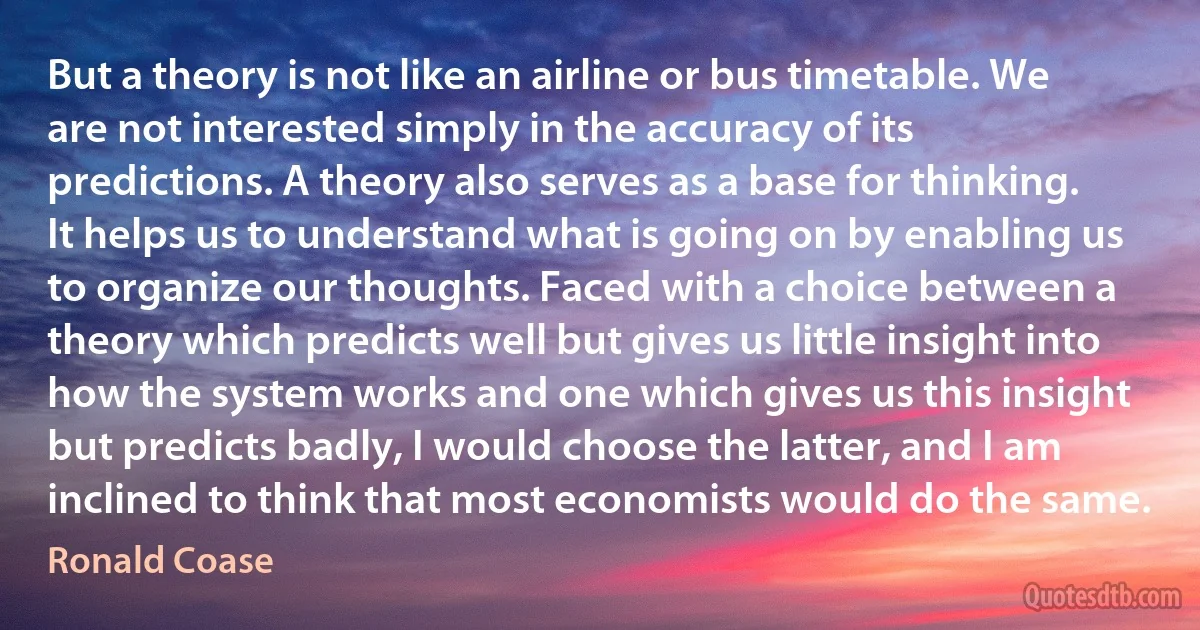Enabling Quotes - page 2
The bicycle is a city thing, virtually useless anywhere excepting on a pavement or hard surface of some kind. Without the road it would never have been invented. It is a little mad, both in design and purpose. Two wheels held together in a frame, with a simple mechanical system enabling a forward movement for one person.

William Saroyan
[S]ince the essence of the soul is but a will to bestow, and all its manifestations and possessions are fulfillments of that will to bestow (...) therefore it is immortal and irreplaceable. The soul, with all its manifestations is eternal and exists forever. Absence does not apply to them upon the departure of the body. On the contrary, the absence of the corrupted form of the body, greatly strengthens it, thus enabling it to rise to the Heavens. Thus we have clearly shown that the persistence in no way depends upon the concepts it has acquired, as philosophers claim, but its eternality is in its very essence, meaning in its will to bestow, which is its essence. And the concepts it acquires are its reward, not its essence.

Yehuda Ashlag
Mature cognitions of folkpsychology and agency include metarepresentation. This involves the ability to track and build a notion of self over time, to model other minds and worlds, and to represent beliefs about the actual world as being true or false. It also makes lying and deception possible. This threatens any social order. But this same metarepresentational capacity provides the hope and promise of open-ended solutions to problems of moral relativity. It does so by enabling people to conjure up counterintuitive supernatural worlds that cannot be verified or falsified, either logically or empirically. Religious beliefs minimally violate ordinary intuitions about the world, with its inescapable problems, such as death. This frees people to imagine minimally impossible worlds that seem to solve existential dilemmas, including death and deception.

Scott Atran
Early in 1954 I was appointed Lecturer in Economics at the University of Queensland in Brisbane. Then, in 1956, I was awarded a Rockefeller Fellowship, enabling me and Anne to spend two years at Stanford University, where I got a Ph.D. in economics, whereas Anne got an M.A. in psychology. I had the good fortune of having Ken Arrow as advisor and as dissertation supervisor. I benefitted very much from discussing many finer points of economic theory with him. But I also benefitted substantially by following his advice to spend a sizable part of my Stanford time studying mathematics and statistics. These studies proved very useful in my later work in game theory.

John Harsanyi
Philosophy can take us no further than enabling us to command a clear view of the concepts by means of which we think about the world, and, by so doing, to attain a firmer grasp of the way we represent the world in our thought. It is for this reason and in this sense that philosophy is about the world.

Michael Dummett
The soil would have soon fallen into the hands of United States capitalists. The products are so valuable in commerce that emigration there would have been encouraged; the emancipated race of the South would have found there a congenial home, where their civil rights would not be disputed and where their labor would be so much sought after that the poorest among them could have found the means to go. Thus in cases of great oppression and cruelty, such as has been practiced upon them in many places within the last eleven years, whole communities would have sought refuge in Santo Domingo. I do not suppose the whole race would have gone, nor is it desirable that they should go. Their labor is desirable-indispensable almost-where they now are. But the possession of this territory would have left the negro 'master of the situation', by enabling him to demand his rights at home on pain of finding them elsewhere.

Ulysses S. Grant
Courtesy is a science of the highest importance. It is, like grace and beauty in the body, which charm at first sight, and lead on to further intimacy and friendship, opening a door that we may derive instruction from the example of others, and at the same time enabling us to benefit them by our example, if there be anything in our character worthy of imitation.

Michel de Montaigne
To me poor people are like bonsai trees. When you plant the best seed of the tallest tree in a flower-pot, you get a replica of the tallest tree, only inches tall. There is nothing wrong with the seed you planted, only the soil-base that is too inadequate. Poor people are bonsai people. There is nothing wrong in their seeds. Simply, society never gave them the base to grow on. All it needs to get the poor people out of poverty for us to create an enabling environment for them. Once the poor can unleash their energy and creativity, poverty will disappear very quickly.

Muhammad Yunus
The liberal conceives of men as imperfect beings. He regards the problem of social organization to be as much a negative problem of preventing 'bad' people from doing harm as of enabling 'good' people to do good; and, of course, 'bad' and 'good' people may be the same people, depending on who is judging them.

Milton Friedman
There is room in the world, no doubt, and even in old countries, for a great increase of population, supposing the arts of life to go on improving, and capital to increase. But even if innocuous, I confess I see very little reason for desiring it. The density of population necessary to enable mankind to obtain, in the greatest degree, all the advantages both of co-operation and of social intercourse, has, in all the most populous countries, been attained. If the earth must lose that great portion of its pleasantness which it owes to things that the unlimited increase of wealth and population would extirpate from it, for the mere purpose of enabling it to support a larger but not a better or a happier population, I sincerely hope, for the sake of posterity, that they will be content to be stationary, long before necessity compels them to it..

John Stuart Mill
[...] we can strip off all grammatical clues to sentence structure, all affixes and prepositions, and yet still achieve communication. Thus restricted to nouns, simple "stories" can be told in word chains: Woman, street, crowd, traffic, noise, haste, thief, bag, loss, scream, police.... Again, the reader's past experience of his language is sufficient to restore the missing elements, sufficiently accurately for the purpose. But of course, not only does the reader have experience of sentence structure, enabling him to supply the missing syntactical elements, but also he has experience of typical contexts in which the various words are used; many words bear an aura about with them. It might be more difficult to tell a tale about a policeman who robbed a woman, for instance, with so little redundancy!

Colin Cherry



